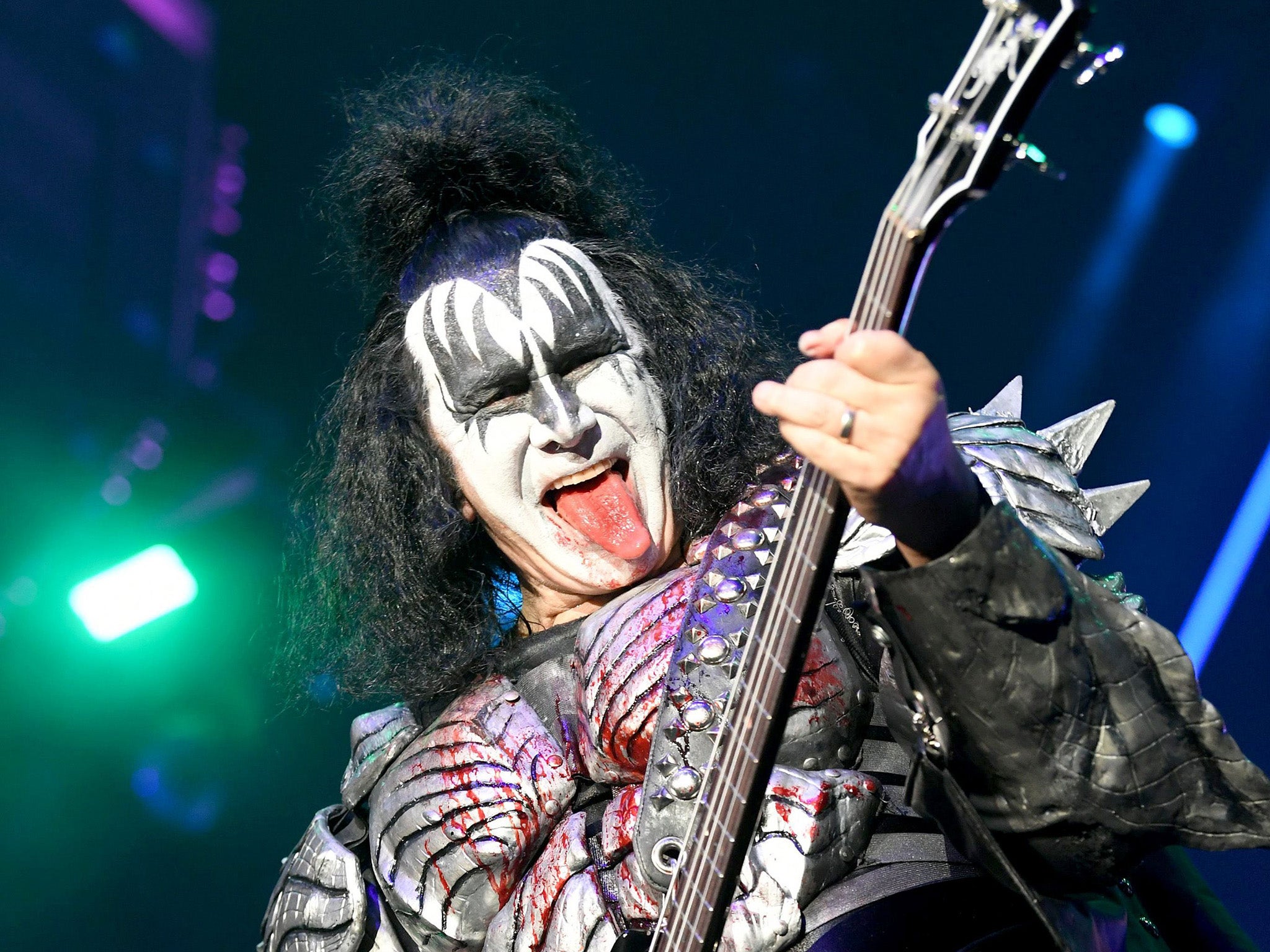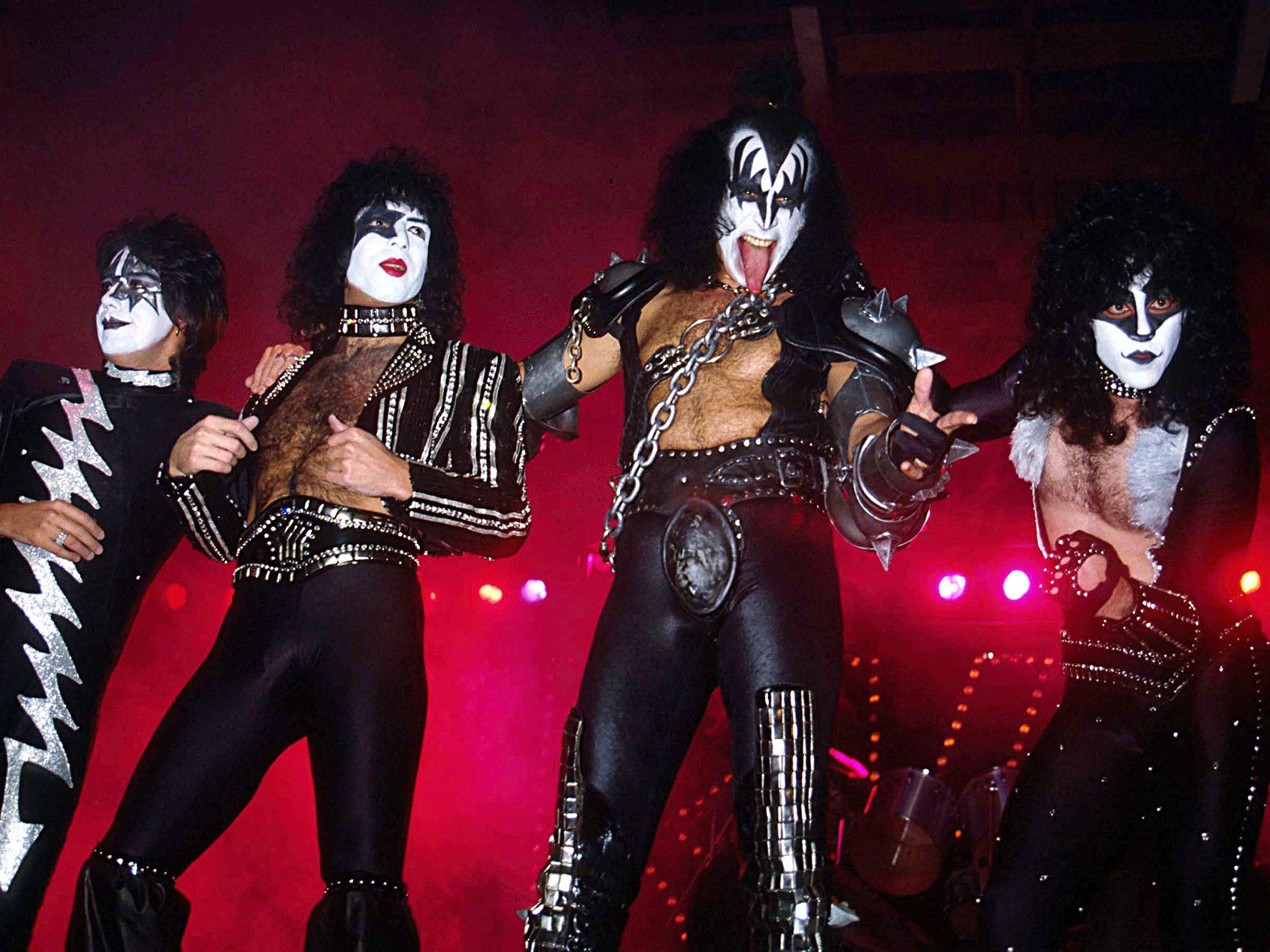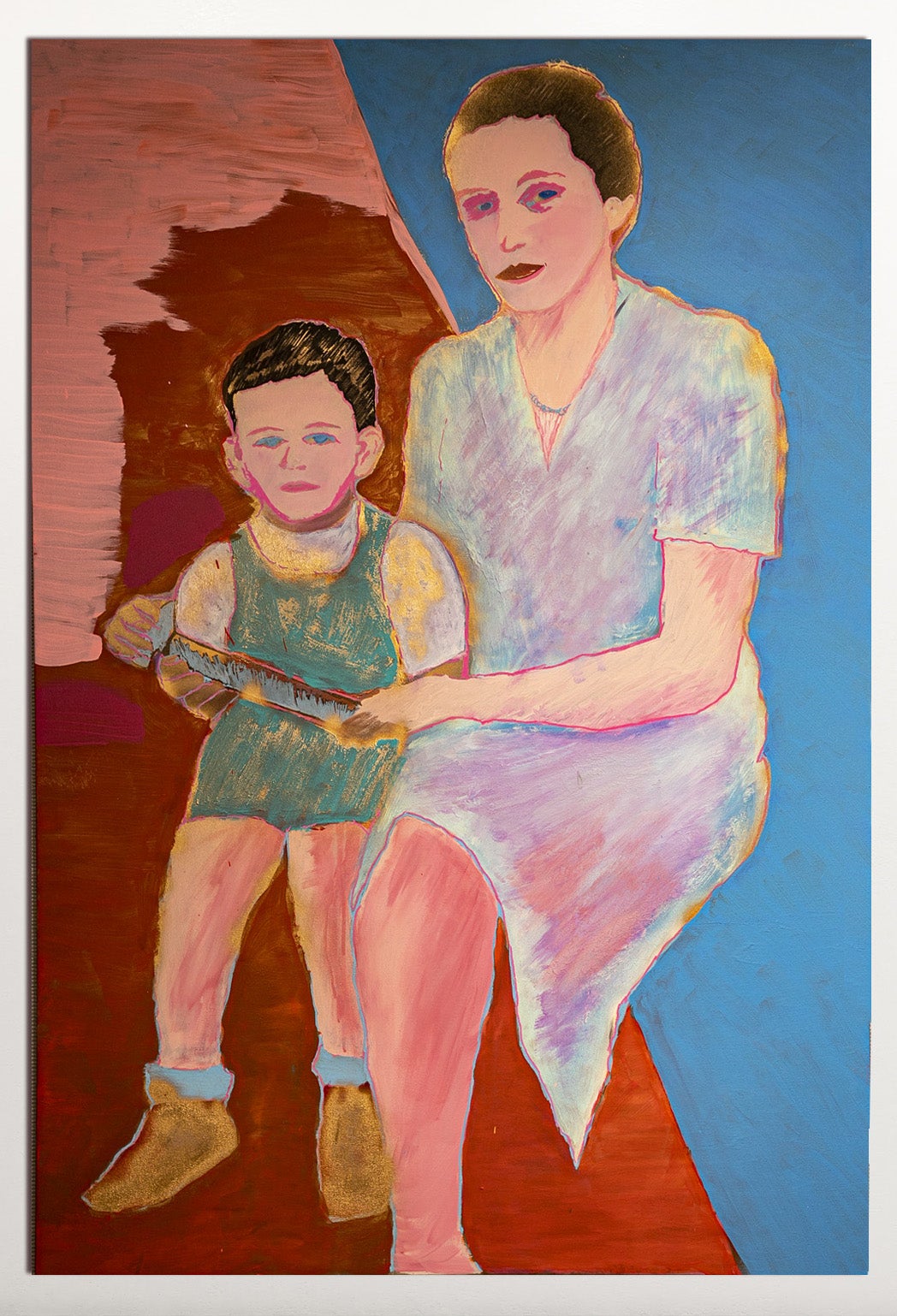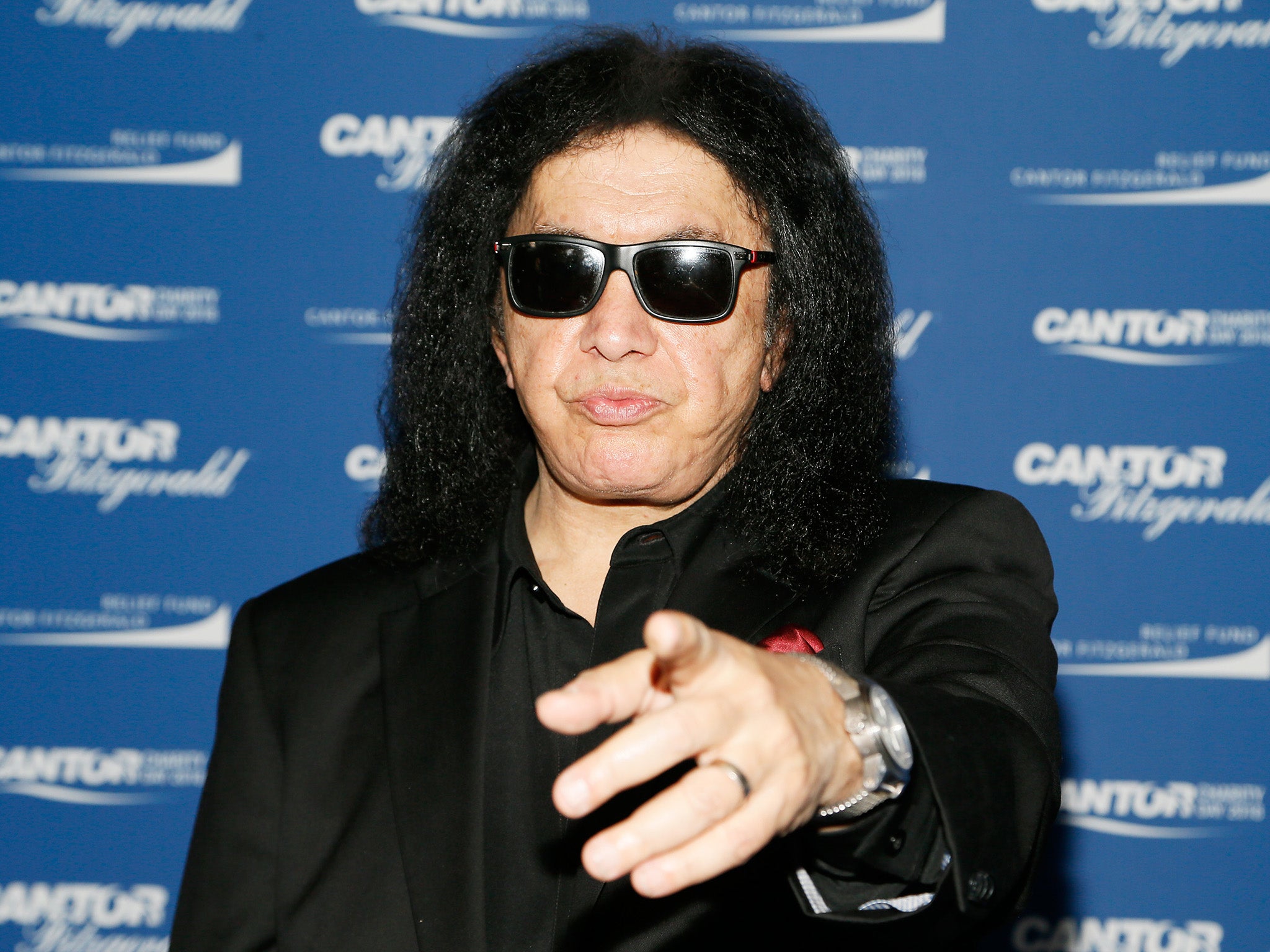Gene Simmons: ‘My eyesight’s good. My schmeckle works. What else do you want?’
At 72, the Kiss bassist is unveiling his debut art collection. He tells Kevin E G Perry about calling time on touring with his famous glam-rockers, what he learnt watching Andy Warhol at work and why he’ll always be a mummy’s boy


In an anonymous building somewhere in North Hollywood, a handful of roadies stride about tuning guitars in front of an elaborate drum kit bearing the legendary logo: “KISS.” The instruments fall silent in unison to announce the entrance of the band’s hulking 6ft 2in bassist Gene Simmons. The 72-year-old wears leather trousers, an embroidered denim shirt, dark sunglasses and a black baseball cap illustrated with a cartoon dollar bag. His most recognisable appendage, that famous seven-inch reptilian tongue, is hidden completely behind a square of black cotton. Forget Frank Sinatra with a cold: Gene Simmons is wearing a face mask.
Simmons is taking pandemic precautions seriously, and with good reason. Within a week of our meeting, Kiss frontman Paul Stanley, the band’s only other original member, will test positive for Covid, and shortly afterwards Simmons will too. At least four stops on their farewell End of the Road tour will have to be postponed. Today, Simmons rejects a small back room as the venue for our interview on the grounds that we’ll be in too close quarters. Instead we sit socially distanced right in the middle of the rehearsal space, which brings its own problems. We’ve barely started talking when Simmons hears a murmur from the roadies now gathered in a far corner. “So you guys are going to talk while we’re doing an interview?” huffs Simmons before adding, to no one in particular: “Can you get him out of the room, please?”
He turns back to me, muttering: “He knows I know where he lives.”
This sort of performative assholery is part of the persona Simmons has cultivated in the almost five decades he’s spent as the fire-breathing demon of Kiss, part rock star and part pantomime villain. He seems to believe it is required of him. A few minutes later, one of the various electronic devices in the room makes the mistake of letting out an audible bleep. “That’s not irritating at all, that sound!” barks Simmons immediately, before adding to me, sotto voce: “See what I’m doing there? I’m torturing everybody. It’s my job.”
We’re here to talk about Simmons’s other new job. Never content with merely playing in one of America’s most successful rock groups (Kiss have more US gold records than any other band in history), Simmons is a serial entrepreneur who founded a restaurant chain (Rock & Brews) and spearheaded the drive to licence more than 5,000 pieces of Kiss-branded merchandise, including motorbikes, pinball machines and even a brightly airbrushed coffin known as the Kiss Kasket. Now he’s announced the first ever exhibition of his own artwork, a gallery show in Las Vegas ranging from sketches and drawings to larger paintings, and without a protruding tongue in sight.
Are we seriously to believe that beneath the boorish exterior, a sensitive artist has been lurking this whole time? Simmons demurs. “No, I never claimed to be anything,” he says. “There are many, many more deserving people, but I do have the Midas touch. I’m so grateful that anybody throws accolades in my general direction.” His tone turns strangely combative. “Now, these are big words, like ‘gymnasium’. I don’t know if you’re following?”
I realise it’s now my turn to be tortured as Simmons slides into an absurd parody of a British accent. “’Ere I am working my fingers to the bone,” he attempts, like a deflating Cockney. “It’s a bit of Dick Van Dyke, you know what I mean?” I tell him he’s lost me, and ask if he thinks that’s what my accent sounds like. “You don’t have an accent – it’s your language,” he shoots back, nonsensically, but it’s enough to nudge his thoughts back towards his potted history as an artist. “I’m an only child to my mother,” he continues. “And I’ve had a lot of time to myself. I doodled all my life. I couldn’t keep my hands still.”

Simmons was born Chaim Witz in Haifa, Israel, on 25 August 1949. His father, Ferenc Witz, abandoned the family while he was still young. His mother, Flóra Klein, was a Holocaust survivor who brought her eight-year-old son with her when she immigrated to New York in 1957. Simmons didn’t speak English, so he taught himself using comic books and American television. By the time he was a teenager, he’d had hundreds of illustrations published in science fiction and comic fanzines under the name Gene Klein. He takes out his phone to show me something he drew when he was 14 or 15, the cover art for a fanzine called Fantasy News showing the head of a T-rex erupting from some sort of lake. “Out of the wa-er,” suggests Simmons, back in his excruciating British accent.
Simmons left his ambitions as an illustrator behind when Kiss got going in 1973, but says he returned to the artform last year to keep him occupied after the pandemic derailed the band’s tour plans. He pulled decades’ worth of his art out of storage, and decided to attempt larger-scale paintings for the first time. “We all have those ‘What if?’ moments,” he says. “Mine was: ‘I’ve never painted. What if I get canvases and paint and see what happens?’ I was trying to stay safe with our family during the sad and tragic pandemic, where almost 700,000 Americans lost their lives, and many more worldwide. People think it was just a pain in the ass, but no, people died. There are still tens of millions of people who are in denial, not just the Egyptians.” He pauses to make sure I’ve caught his dad-joke witticism. “‘In the Nile,’” he repeats, slowly. “You see what I did there?”
As a painter, Simmons says he draws inspiration from Jackson Pollock and Andy Warhol, with whom he spent a day in the studio in the late Seventies. They had been introduced at Warhol’s Studio 54 by Simmons’s then-partner, Cher, whom he dated before starting a relationship with one of her friends, Diana Ross. “Extraordinary ladies!” says Simmons. “You should be so lucky that they give you the time of day, much less anything else. These ladies clawed their way through a man’s world. Besides the talent and the beauty and everything else, they were self-made women and they were extraordinary.”
As for Warhol himself, Simmons remembers the artist as being “always curious, and the shyest person I’ve ever met”. He believes it was this innate inquisitiveness that made Warhol great. “He was interested in people,” says Simmons. “You didn’t have to be anybody. He would ask everyone questions. His art, untrained though it was, came from that. When I found myself in the studio watching Andy work, it was not what I expected. He was more like a movie director. He’d tell the guy with the red stuff, ‘Put a little red over here.’ He saw it all in his mind, and his art was his choice. That was a thing I put in the back of my mind: ‘Oh, I’ve seen greatness at work, but greatness that he created.’”

By the time Simmons was hanging out at Studio 54 and dating musical icons, Kiss had enjoyed one of the most curious rises to fame that any band has ever managed to pull off. Between 1974 and 1975, Kiss released three albums (Kiss, Hotter Than Hell and Dressed to Kill) which built a cult following (the self-proclaimed “Kiss Army”) but failed to trouble the charts or, crucially, make any money. Their fourth record, a live album titled Alive!, released in September 1975, was considered a last ditch roll of the dice for the band and it paid off spectacularly. The album captured the sheer thrill of their spectacle-heavy live show and went platinum four times over, giving the band their first top 40 hit with the live version of previous single “Rock and Roll All Nite”.
For Simmons, this was when the rest of the world finally caught up with his own stratospheric opinion of himself. His iron-clad belief in his specialness came, he says, not from his musicianship or his stage presence but from his early experiences with his parents. “I understand that I have a big ego, and it has a lot to do with being abandoned by my father,” he says. “We were. It’s not unique. Men have a shameful history of just picking up and walking out of their families. My mother worked all the time, six days a week. She was my moral compass. From her point of view, to think of humanity in any way positively, after being in a German concentration camp at age 14? You have to be a superior human being. I would not think highly of humanity in that situation, the way my mother did. She used to tell me: ‘You’re going to do great things.’ You’re starting to smile because you see a joke coming, but my mother doesn’t lie to me. She said I was going to be great, and I am f***ing great.”

Simmons’s devotion to his late mother, who died in 2018 at the age of 93, is admirable – but it’s hard not to wonder if she approved of all the situations his ego landed him in. In 2017, Simmons was banned for life from conservative talk show Fox & Friends for being too obnoxious, which surely takes some doing. (It was said he burst uninvited into a staff meeting, unbuttoning his shirt and telling jokes, which doesn’t exactly sound out of character.) Before that, he had been involved in a notorious NPR interview in 2002, during which he told host Terry Gross, in response to a question about the studded codpiece he wears onstage, that: “If you want to welcome me with open arms, I’m afraid you’re also going to have to welcome me with open legs.”
Simmons remains wholly unapologetic. “I was totally on point, because you should be able to get as good as you give,” he argues, still able to get himself worked up over perceived slights from Gross. “She said: ‘Tell me about the Kiss.’ I said: ‘Tell you about the Kiss’? Tell me about the NPR. It sounds like a communicable disease.’ She goes: ‘Well, you can’t say that.’ I can say whatever I want! When you draw first blood, you can’t complain that the person sitting there doesn’t just sit idly by and not cast a stone. She was judge and jury. Not gonna work.”
In the recent career-spanning documentary Biography: KISStory, Simmons manages a little more self reflection. “I succumbed to fame,” he says in the film. “Not with chemicals and alcohol, but with ego… It’s easy to look at someone who’s suffering with alcohol or drugs and say: ‘Hey, you got a problem, buddy.’ Mine was more hidden. Being full of myself, that’s what it was.”
It’s about dignity and self respect. We’ve all seen boxers who stay in the ring too long, and bands that tour too long.
Sadly there’s still no rehab facility for being too full of yourself, but Simmons leaps at the opportunity to discuss his lifelong sobriety. “I’ve never taken any drugs. Not marijuana, not coke, not crack, not heroin, nothing,” he says. “Never smoked cigarettes. Never been drunk in my life, not once. I don’t say this to try to convince anybody, because you should get a menu in life and pick what you want. You can eat desserts all the time, but you’re gonna f*** up your body.”
No prizes for guessing who inspired this abstinent mindset. “You’ve got to eat your vegetables,” he continues. “Your mother told you that, and your friends were assholes and idiots. You say: ‘Ah, what does she know?’ Actually a lot, and you don’t know anything. You were just born, connected by your umbilical cord to a wiser human being. You ignore that when you listen to the idiot who’s with you saying: ‘Let’s get high, let’s drive the car too fast.’”
His mother, he says, was his own personal Jesus. “And even Jesus is not loved by everybody,” he adds, as I sense another detour coming. “You can’t do better than that. I hope not to be crucified, but I am Jewish. Do you know how we know Jesus was Jewish? He lived with his mother until he was 33, his mother thought he was God, he thought his mother was a virgin, and then he went into his father’s business. That’s a Jewish guy!” He’s not done yet. “Do you know why all the chicks love Jesus?” He stretches his arms out on either side. “Well, he’s hung like this…”
Simmons the gag machine evidently can’t be stopped, but his band can. Kiss first embarked on a “farewell” tour back in 2000, with Simmons and Stanley joined by original members guitarist Ace Frehley and drummer Peter Criss for a last outing. This time, however, Simmons is adamant that when the current End of the Road tour eventually gets back on track, it really will be the last we see of Kiss as a live act. “It’s about dignity and self respect,” he says. “We’ve all seen boxers who stay in the ring too long, and bands that tour too long. There’s a physicality to what we do. You know, I could have picked a smarter band to be in…”

He wearily laments the fact that members of other bands are able to tour in T-shirts and comfortable shoes. “Me? I’ve got to do two hours of make-up preparation, then wear 40 pounds – and I don’t mean English money – of armour and studs and all that stuff, and then seven-inch platform heels,” he says. “We’ve been flying through the air in all that for almost half a century, and it’s f***ing backbreaking work! We introduce ourselves with: ‘You wanted the best, you’ve got the best. The hottest band in the world: Kiss!’ I don’t want to be up on that stage a day longer than those words are true. Instead of: ‘You wanted the best. Well, they used to be pretty good. And now here they are today…’ While we’re at the top of our game, and while I still have a tooth left in my skull, get the f*** off the stage.”
Simmons likes to compare himself to a great white shark, the apex predator that will die if it ever stops moving forward. I wonder, then, whether he worries about his own fate once Kiss are no more. Does he ever consider his own mortality? “Mortality?” He ponders the word. “It helps to be delusional. As long as I’m enjoying life, I don’t think about death. It’s gonna come. It could be the next bus coming around the corner, or it could be some kind of disease. Thank God, I’ve never had operations. I don’t get sick. I don’t have colds. My eyesight’s good. My schmeckle works. What else do you want?”
We’ve reached the final kiss-off. It’s almost time for the band’s rehearsal to begin. Simmons gingerly eyes the staggering line-up of vertiginous armour-plated platform boots arranged neatly beside him, waiting. When the end does come, will Gene Simmons be buried in a Kiss Kasket? “Or a Kiss urn,” he says, physically unable to resist squeezing in one last dad joke. “We make Kiss condoms. We make Kiss Kaskets. We’ll get you coming and we’ll get you going.”
‘Gene Simmons Artworks’ is at Animazing Gallery in Las Vegas from 14-16 October
Join our commenting forum
Join thought-provoking conversations, follow other Independent readers and see their replies
Comments


Bookmark popover
Removed from bookmarks